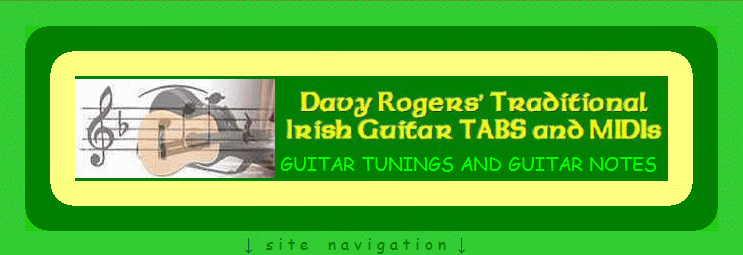| |
For convenience use has been made of colour coding in the tabulated
lists of tunes
(on Page 2,
Page 3,
Page 4,
Page 5,
Page 6, and Page 7)
By far the most widely used guitar
tuning is 'Standard' tuning (EADGBE) but many guitarists over the
years have been intrigued by the different sounds the guitar has to offer when the
open strings are tuned differently. These 'Alternate' tunings can inspire creativity because of the unique chord voicings
they offer and many artists have utilised these sounds over the years and produced a lot of great music.
Tuning your guitar to sound a major, minor or modal chord is very
useful in performing
traditional Irish music, especially in interpreting music originally
played on the harp.
A modern harpist would use semitone levers to raise the pitch of
selected strings
one semitone in order to tune the harp to any major or minor key. A
guitar player
can emulate this by using the any of the above "open" or
"alternative" tunings.
The TablEdit programme comes with a built-in tuner for the guitar
tuning used.
A good quality capo is also required. I use a "Kaiser" clothes
peg-type
for quick changes, or a "Quickdraw"
(recommended).
The most basic alternative tuning is
DADGBE
(by convention from the bass or 6th string) or "Dropped
D tuning". This tuning is better suited to tunes in the key of D or Dm, than
standard tuning
EADGBE,
where the bass string is tuned to E and is effectively redundant
when the first position D chord is played. A much fuller and richer
basic D chord can be produced with the bass string tuned to low D.
As with most open tunings strings are lowered rather than raised in
pitch to prevent breaking strings. If you decide to tune your guitar
to any of the above tunings you'll be slackening
tension
only
in selected strings. You'll
never
need to tighten the tension in any string higher than standard
tuning, so don't be afraid of breaking strings.
There is one exception
to this, Open C (CGCGCE)
is the only tuning where a string (the B
string) is raised in pitch one semitone to C.
DADGAD
tuning is also known as "D Suspended" and "Celtic tuning" and is one
of the most popular tunings of all time. It all started with Davey
Graham and other English and Irish fingerpickers including Jimmy
Page. The string layout is quite simply: D, A, D, G, A, D, from bass
to treble. To get there from standard tuning simply slacken the 1st,
2nd and bass strings one while tone (2 semitones). Essentially, you
tune to a Dsus4 chord (that is what you hear if you play all string
open). Since the tones are close to many D chords, the tuning is
extra suitable for playing in the D key. DADGAD
tuning is a tuning that really opens up the guitar. As with most of
the alternate tunings, DADGAD
requires medium gauge strings. When working with DADGAD
it's important to leave the guitar in this tuning for a while. This
allows the guitar to settle into the new string tension and even out
the tone. If possible, dedicate a guitar to DADGAD and keep medium
gauge strings on it. You can then experiment with the other open
tunings, which are fairly close in terms of string tension and
sound.
There are
many
more open tunings for the guitar. See Steve McWilliams's
comprehensive list at:
CLICK HERE FOR LIST
I have found, like many other guitarists, that the above 11
alternative guitar tunings are the most
useful for playing both
traditional Irish tunes and other types of folk and modern music.
DADGAD
and
Open G
(DGDGBD)
are my favourites and I use them more than any other tuning.
There
may be more tunings out there such as "Orkney"
tuning (CGDGCD)
with which
I am currently experimenting and discovering new
possibilities.
Thanks
Steve Baughman
Also thanks to Simon Prager, blues and ragtime guitarist from the
U.K. for suggesting
DADEAE.
To quote from Simon's message in my Guestbook:
". . .
.because you can play in D, G, A, E and a few other keys without a
capo".
It would seem to be a variation on Open E modal (EADEAE)
which was
kindly given to me by Dick Gaughn many years ago
(see "Baptist
Johnston" on the o'Carolan page)
Download this
Alternate Tunings
(PDF).rar
and unpack this folder for much more information
Happy plucking,

|
|

